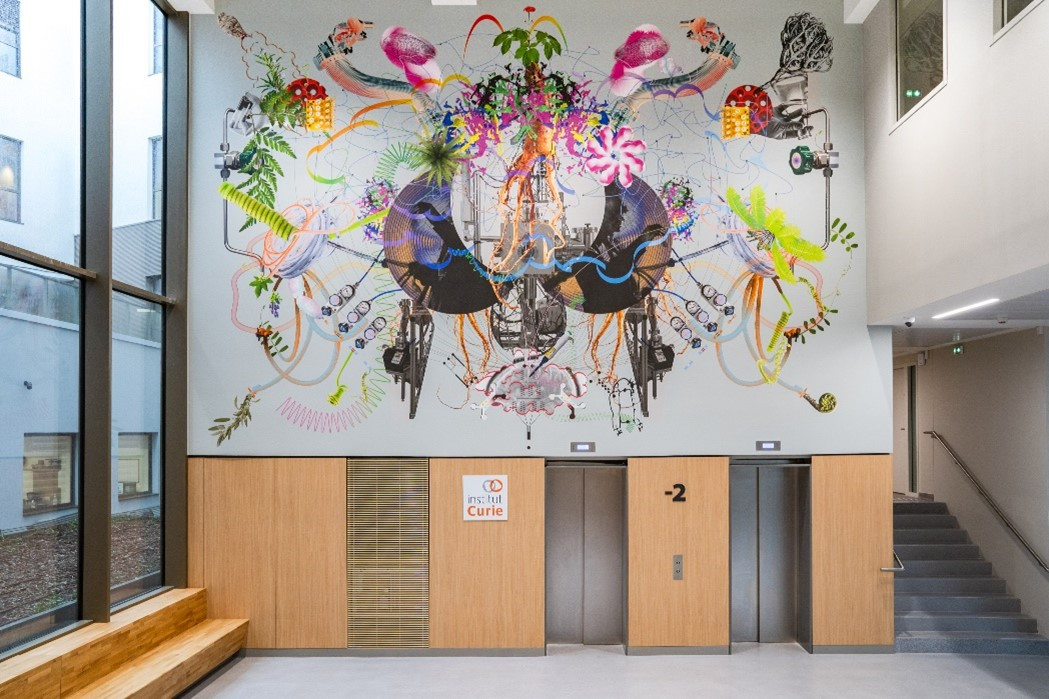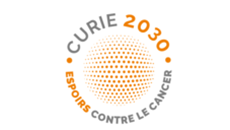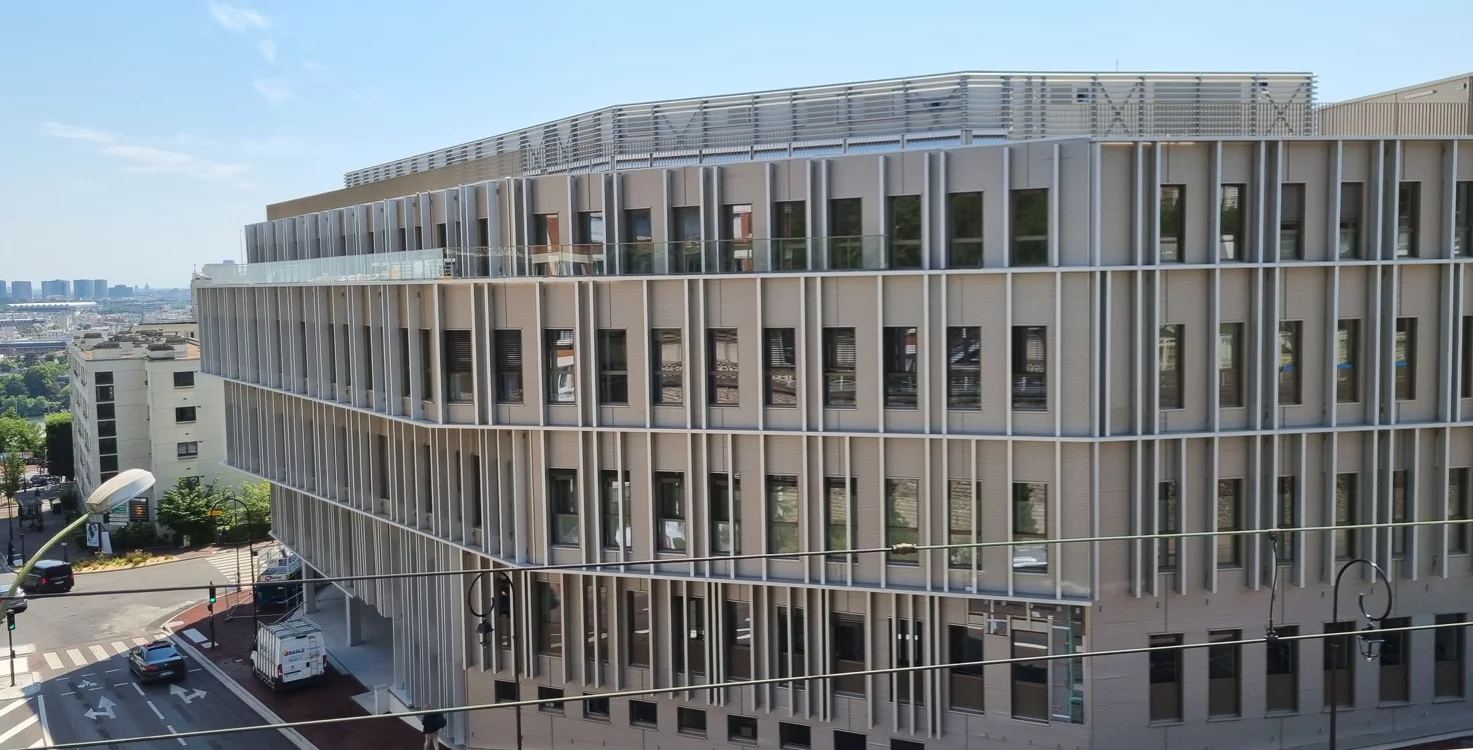This inauguration is the culmination of a vast project which began in 2019 as part of the MC21 strategic plan stands for Marie Curie 2021) It reveals our ambitions for improved treatment for our patients and also marks the gradual arrival of researchers at our Saint-Cloud site. The launch of construction work for the Paris Saclay Cancer Cluster (PSCC) cellular therapy platform is a second major phase. It’s naturally very satisfying to see this project come to fruition. It is the culmination of the work of many hospital and research teams, supported by all of Institut Curie’s departments”, explains Prof. Thierry Philip, Chairman of the Executive Board at Institut Curie.
|
Key figures for Institut Curie at Saint-Cloud
|
The new hospital in video
Promoting the oncology of the future in western Paris
Institut Curie in Saint-Cloud has expanded with a 14,000 sq. m extension to the existing hospital structures. The site now boasts 34,000 sq. m of available space, new or renovated, for care and research to promote excellence in oncology and provide benefit to patients.
- New spaces to offer the best conditions including expanded waiting rooms and redesigned consultation and procedure rooms;
- Smoother courses of treatment for optimum care: shorter patient journeys, especially for outpatient services, optimized medication circuit, easier delivery of samples between operating rooms and analysis laboratories...;
- Renovated and spacious premises designed to facilitate the teams’ work and promote well-being at work;
- Modernized laboratories and equipment to ensure faster progress in fighting cancer and to develop new state-of-the-art research.
Over the past decade, the incidence of cancer has increased, but mortality has fallen due to progress in screening and treatment.
“Scientific and medical breakthroughs, as well as the shift of mentality in our society, have profoundly changed cancer care by physicians and health professionals, but also the way in which patients experience the disease. Institut Curie’s new hospital is evidence of its desire to meet the new challenges in oncology, by providing the best conditions for care and treatment for our patients, while facilitating the daily lives of the teams in modern and pleasant premises that are adapted to today’s courses of care. It will also anchor the position of Institut Curie in the new territorial dynamics of the organization of oncology in western Paris”, enthuses Prof. Steven Le Gouill, Director of the Hospital Group at Institut Curie.
In order to respond to these shifts, the renovation plan included prior collaborative discussions within a working group made up of health professionals at Institut Curie and the architect firm AIA Life Designers[1]. The project was designed with the vision of medical staff and health professionals in order to adapt the architecture and organization to suit the changes in cancer care and the patient’s role in the care process. To ensure that this vision was a comprehensive one, a “patient partner” was included in the working group to express the expectations of patients.
Bolstered by long-standing partnerships with leading institutions in western Paris, collaborations will continue and even develop in areas of expertise and in locations where Institut Curie is a leader, with the Centre Hospitalier Versailles and GHT Sud Yvelines, the CH4V Saint-Cloud/Sèvres, Ambroise Paré hospital in Boulogne, the hospitals of Juvisy - Longjumeau – Orsay/GH Nord Essonne, and Foch hospital in Suresnes.
Strengthening the research-care continuum
“The renovation of the Saint-Cloud site, with 2,100 sq. m dedicated to research, represents a unique opportunity for the development of new and highly innovative programs, sources of hope for new treatments to benefit patients”, enthuses Prof. Alain Puisieux, Director of the Institut Curie Research Center. The research-care continuum, the heart of Institut Curie’s strategy, will be strengthened with the launch of the future cellular therapy platform in the Paris Saclay Cancer Cluster (PSCC[2]) in 2024 and the installation of new research teams in 2024-2025.”
A cellular therapy platform with cutting-edge technology - early 2024
The creation of the cellular therapy platform with the PSCC will help accelerate momentum for transfer of technologies with companies and therapeutic innovation for patients through the design of original treatments based on Car-T cell technology and their developments in the clinical setting. This platform is part of the Tumor Microenvironment, Immunology and Cellular Therapy program of the Curie 2030 scientific project, as well as the Hospital-University research project (RHU) EpCART. This project aims to test an innovative and tailored therapeutic approach, a cellular therapy combining immuno-epigenetics with CAR-T therapies, originating from the research conducted at Institut Curie and developed by its spin-off Mnemo Therapeutics. After full pre-clinical approval of this unique approach, a clinical trial will assess the feasibility of the production of these original cellular therapies and the absence of side effects in patients with solid tumors.
This unique platform (650 sq. m, 30 dedicated people) will provide an exceptional environment with a diversity of technologies that are found nowhere else. It is also connected to the talent networks within the PSCC to assist the teams working on the therapies of the future, including hospitals, pharmaceutical companies and start-ups towards a single goal: innovating faster and better.
The “Computational biology and Systems medicine” future program - early 2025
Through an interdisciplinary and holistic approach, the main goal of this program is to analyze and integrate various types of markers (biological, ohmic, imaging or clinical) by developing and using artificial intelligence tools, in order to understand the connections between biological mechanisms observed at different scales and to identify combinations of biomarkers and therapeutic targets that can be used for precision medicine in oncology. By the beginning of 2025, the renovation of around 1,400 sq. m of space dedicated to research will accommodate teams from two units of the Research Center[3] to ensure the success of these far-reaching projects.
“The strategic location of research teams within the hospital and therefore close to the physicians involved, is a vital asset for successfully meeting our goals in the cognitive and medical fields”, explain Prof. Steven Le Gouill and Prof. Alain Puisieux.
 Haegue Yang
Haegue Yang
Burgeoning Polyscopic Vista | Vision Polyscopique Bourgeonnante, 2023
Courtesy of the artist Haegue Yang, Institut Curie and the Galerie Chantal Crousel, Paris.
© Jiayun Deng – Galerie Chantal Crousel
Designed specially for Institut Curie’s new building in Saint-Cloud, the art work by the artist Haegue Yang, Burgeoning Polyscopic Vista, is inspired by the history of the place, its mission and its leading role in oncology as a state-of-the-art hospital and research group in Europe and worldwide.
Using photographs from research laboratories in this work of art, as well as images from archives and many other motifs, Haegue Yang creates a surface where knowledge, reality and optics come together to form a new forward-looking environment.
The work of art, set against a calm, monochrome background, was inspired firstly by Haegue Yang’s interest in medical imaging technologies, such as X-rays, computed tomography (CT), magnetic resonance imaging (MRI) and ultrasound. These technologies, which are used to diagnose and treat diseases, are often unknown to the general public.
The painting’s composition is central and frontal, beginning with the image of an electronic microscope in the upper central part. Motifs from brain MRIs form the central core, connected downward and on each side to a portrait of Marie Curie, then a young woman, hard at work. A network of threads spins all around the core, resembling a neuron system transmitting signals between the brain and the rest of the body.
Haegue Yang donated this work of art to Institut Curie. The project was completed with support from the Galerie Chantal Crousel.
 Focus on the Curie 2030 strategic plan
Focus on the Curie 2030 strategic plan
Curie 2030 is Institut Curie’s strategic plan for the coming years. It reaffirms its unique model as both a “Basic Science Center” and a “Comprehensive Cancer Center”.
A basis of shared values and goals
Setting a course and setting targets to be reached collectively were therefore the main goals of this plan, which pays tribute to Institut Curie’s values and ambitions.
It is a new key step that sets out the future of the Institut Curie model. A model that has been rooted for more than a century in the shared values of Marie Curie and Prof. Claudius Regaud, and which has evolved without losing its special and unique character.
This global cross-departmental and unifying plan was built by drawing on four core overarching principles:
- A deliberately participative, collective and collaborative approach;
- A reflection based on the values shared with the 3,736 employees at Institut Curie;
- Promotion of the research-care continuum that is the hallmark of Institut Curie by encouraging cross-disciplinary exchanges between institutions;
- A social plan at the heart of the institutional plan, in the sense that the Curie Spirit is brought to life day after day by the men and women who embrace it.
8 strategic focus areas
The Curie 2030 Strategic Plan is based on 8 strategic areas of focus that reflect the Institute's main ambitions for 2030. They form the common basis for and are the fruit of reflections resulting from the joint process of construction conducted within the Institute.
- A humanist Institute that takes care of everyone;
- An Institute of excellence in science, teaching and research;
- A leading cancer-fighting Institute that places the patient at the heart of its project;
- An interdisciplinary Institute combining research and care;
- An Institute that fosters innovation and company creation;
- An Institute that puts digital transformation at the heart of its action;
- An Institute with an international reach;
- A Foundation guaranteeing independence, quality and transparency.
This common core will then be supplemented with 9 program-based projects implemented gradually over the course of 2023.
- Social project
- Scientific project
- Medical project
- Medical-Scientific program
- Academic relations and transfer of knowledge
- Digital transformation program
- Governance and leadership organization project
- Corporate Social Responsibility program (CSR)
- Economic model
[1] https://aialifedesigners.fr/projet/institut-curie-saint-cloud/
[2]The leading biocluster selected as part of the France 2030 plan, the Paris-Saclay Cancer Cluster (PSCC) brings together not just Institut Curie but also Gustave Roussy, Inserm, Institut Polytechnique de Paris, Sanofi, Paris-Saclay university, AP-HP, UNICANCER and Medicen, with the ambition of quickly providing innovative treatments, improving courses of treatment, and offering hope and quality of life to people affected by cancer.
[3]“Cancer and Genome: Bioinformatics, Biostatistics and Epidemiology of Complex Systems” - U900 IC/Inserm/Mines Paris-PSL and “Laboratory of Translational Imaging in Oncology” - U1288 - IC/Inserm
